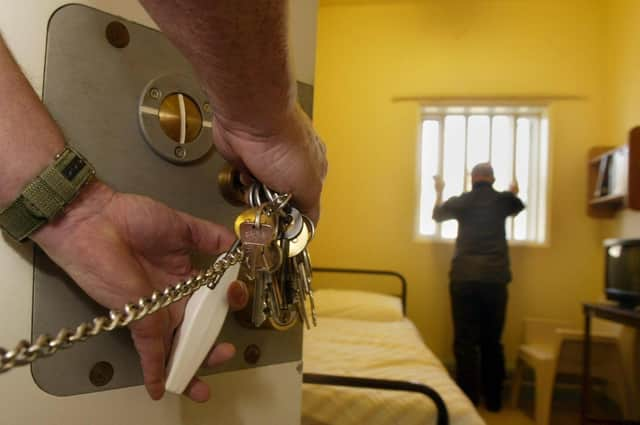Hundreds of prisoners to be released early as prisons cope with spread of virus


Justice Secretary Humza Yousaf has said that those nearing the end of their sentences will be assessed for early release to ensure prison and healthcare staff can manage prisoner numbers during the virus outbreak.
Between 300 and 450 prisoners serving 18 months or less, and who have 90 days or less to serve, will be considered for early release, with the first expected to be freed at the end of April.


Advertisement
Hide AdAdvertisement
Hide AdMr Yousaf said that those imprisoned for life or with convictions for sexual offences, domestic abuse or terrorism offences will be excluded from the early release scheme.
He said: “In this exceptional public health emergency, we are taking focused action to protect public safety as well as prisoners, prison staff and the NHS staff and others that work in our prisons.
“Using these emergency release powers, combined with increasing those on HDC (electronic tags) will substantially increase the availability of single-cell accommodation across the prison estate, which in turn will help SPS contain the spread of coronavirus in our prisons. In addition, the resulting reduction in the prison population will allow the prison service to ease restrictions put on prisoners during these challenging times.”
Scotland’s prisons have been suffering from overcrowding, with MSPs told last September that the population had risen to 8,300 while the prison estate capacity was for 7,800. Inspectors and prison staff said the numbers were impacting the safety of prisoners and prison officers and the outbreak of coronavirus raised fears of inmates and staff becoming quickly infected.
Almost a quarter of Scottish Prison Service staff are currently absent from work amid the coronavirus outbreak, with 89 prisoners in isolation across 12 sites.
Mr Yousaf said the SPS had already made “significant changes” operations, pausing family visits, restricting activities and increasing time in cells to help social distancing. Mobile phones will also be supplied to prisoners to allow them to maintain family contact, “although technical and legal issues are still to be resolved before they are rolled out.”
He added: “We must help staff to manage prisons in a sustainable way over the weeks and months ahead. This latest step – based on the emergency powers passed by MSPs earlier this month – will give them greater capacity to help ensure a safe custodial environment.
“The pace of recent events has been rapid and, in the available time, we have been working with the prison service and community justice partners to consider what appropriate arrangements can be put in place for a number of individuals to be considered for return to their homes and families, just a few months or even weeks before they were otherwise due to be released.
Advertisement
Hide AdAdvertisement
Hide Ad“The SPS is proactively working to increase numbers on Home Detention Curfew (electronic monitoring), however the capacity for HDC is limited by the current lockdown and social distancing measures. It is clear we will must use emergency release powers over and above HDC.
“This is not a decision that I have taken lightly, and I want to assure the victims of crime that this does not diminish what they have suffered. In these exceptional circumstances, I must consider actions that best reduce the prospect of further harm both in prisons and the wider community of which they are part.”
Both the Howard League Scotland and Scottish Human Rights Commission welcomed the move. Judith Robertson, chair of the SHRC, saying: “People in prison are an extremely vulnerable population and those working in prisons are key frontline workers providing a vital public service.
“The epidemiological evidence is clear that prisons are places of high risk in the current pandemic, and the Council of Europe’s Committee on the Prevention of Torture has set out the human rights principles that should be applied to people in prison and other places of detention in this context.
“While a number of measures have been adopted to date by the Scottish Government these measures have not yet managed to reduce the prison population to a safe and manageable level.
“It is therefore crucial to act urgently to reduce the prison population in order to ensure the continued safe and effective operation of prisons in Scotland and we welcome this announcement today that responds to this need.”
She added: “It is important that prisoners are fully supported upon release, with resources allocated to ensure their safe accommodation and to provide them with necessary financial, health and welfare support.
“It is also important to consider, assess and manage any impact of early release on victims, prisoners’ families and wider services in the community. Human rights impact assessments can play a key role in ensuring everyone’s rights are considered and adequately protected.”
Advertisement
Hide AdAdvertisement
Hide AdScottish Green justice spokesperson John Finnie said the government “had a difficult task to consider the rights and needs of victims, prisoners, staff and families” but said the “decision to go ahead with limited early release is the right one, with some important exceptions for public safety.
“Apart from anything else, we simply don’t have enough cells for inmates to self-isolate. However, it is vital those released are given a safe landing going home, and for their families. Many prisoners are released with no home to go to, and as well as housing and financial assistance, individuals often need support with addictions and both physical and mental health issues. This is even more important in the current crisis.
“Families who are already under pressure will also need support if someone suddenly returning home can add to difficulties.”
A message from the Editor:Thank you for reading this story on our website. While I have your attention, I also have an important request to make of you.With the coronavirus lockdown having a major impact on many of our advertisers - and consequently the revenue we receive - we are more reliant than ever on you taking out a digital subscription.Subscribe to scotsman.com and enjoy unlimited access to Scottish news and information online and on our app. With a digital subscription, you can read more than 5 articles, see fewer ads, enjoy faster load times, and get access to exclusive newsletters and content. Visit https://www.scotsman.com/subscriptions now to sign up.
Our journalism costs money and we rely on advertising, print and digital revenues to help to support them. By supporting us, we are able to support you in providing trusted, fact-checked content for this website.
Frank O'Donnell
Editorial Director
